Just picture yourself in a cozy Kyoto café, sipping match as your friend tosses out a Japan riddles that makes you both grin and scratch your head. This is the magic of Japanese riddles (nazo nazo)—clever, playful, and steeped in culture. These witty brain teasers have thrived for centuries, blending wordplay with tradition.
I have always admired the beauty of Japanese culture, and that is why I have been attracted to nazo nazo since my very first visit to Japan in the year 2018. According to this, when I was walking around the busy and the quiet streets of Tokyo and Kyoto, I found a small bookshop where I came across a book of traditional riddles.
I liked them being so simple and deep to learn, so I began to collect them, solve them with friends, and even learn about the Japanese language by using these. I have collected more than 150 of these charming puzzles during the years and each is a tiny but potent window to be opened into a great heritage of Japan.
This is an article where I have brought together the best of Japanese riddles and answers all logged and grouped in specific sections of varying difficulties. You are either a beginner who wants to take the first steps into the world of nazo nazo or a master of puzzles hunting a new interesting challenge, and this guide is designed to help you.
However, prior to getting into the riddles, we will look at what consistitutes their magic. For tips on mastering puzzles like these, learn how to solve riddles like a pro to sharpen your skills.
What Are Japanese Riddles?
Traditional Japanese Nazo nazo are puzzles that have existed in Japan since the times immemorial. As opposed to Western dilemmas, which may be based on lateral thinking or notions, the Japanese dilemmas frequently employ word play, homophones and cultural allusion. To understand the linguistic roots of these puzzles, explore this guide to Japanese language and culture from Japan-Guide.
They are complicated and rewarding at the same time, provided that they are approached on the part of the people who already know the Japanese language, or at least its peculiarities.
For example, a classic Japanese riddle might be:
Riddle: What has a head and a tail but no body?
Answer: A coin (In Japanese, “head” and “tail” refer to the two sides of a coin, making it a clever play on words.)
It is not only fun riddles, but they are educational, too. Nazo nazo are used to educate children in Japan regarding language, culture and critical thinking. You can find them in the children books, television programs and in adult parties where they create laughter and healthy competition. For more puzzles that engage the mind, try these psychology riddles to test your mental acuity.
Types of Japanese Riddles
Japanese riddles appear in diverse different forms all with individual style and uses. These are the broad categories you can find:
- Wordplay Riddles: They are based on the sounds and meanings of words, and may employ puns or homophones.
- Cultural Riddles: These include the elements of the Japanese history, traditions, or day to day life.
- Logical Riddles: These are of deductive and inference nature.
- Mathematical Riddles: These are numerical or mathematical affairs.
- Visual Riddles: These may include interpreting images or symbols though this is less common.
- Historical Riddles: Draw from Japan’s past, like samurai or shoguns.
- Nature-Inspired Riddles: Center on Japan’s landscapes or seasons.
- Modern Riddles: Reference contemporary Japanese life, like technology or pop culture.
This collection offers a combination of these types, so everyone will get something appropriate. For a deeper dive into cultural puzzles, check out Greek riddles for a cross-cultural comparison.
150+ Japan Riddles with Answers: The Allure of Japanese Riddles
I have given each of the riddles sections below according to difficulty and theme. The answers of each riddle are given, and it is easy to try yourself. We had better begin with some simple ones to get warmed!
Easy Japanese Riddles
Perfect for beginners or kids, these riddles are simple yet clever, introducing the playful spirit of nazo nazo with everyday objects and concepts.
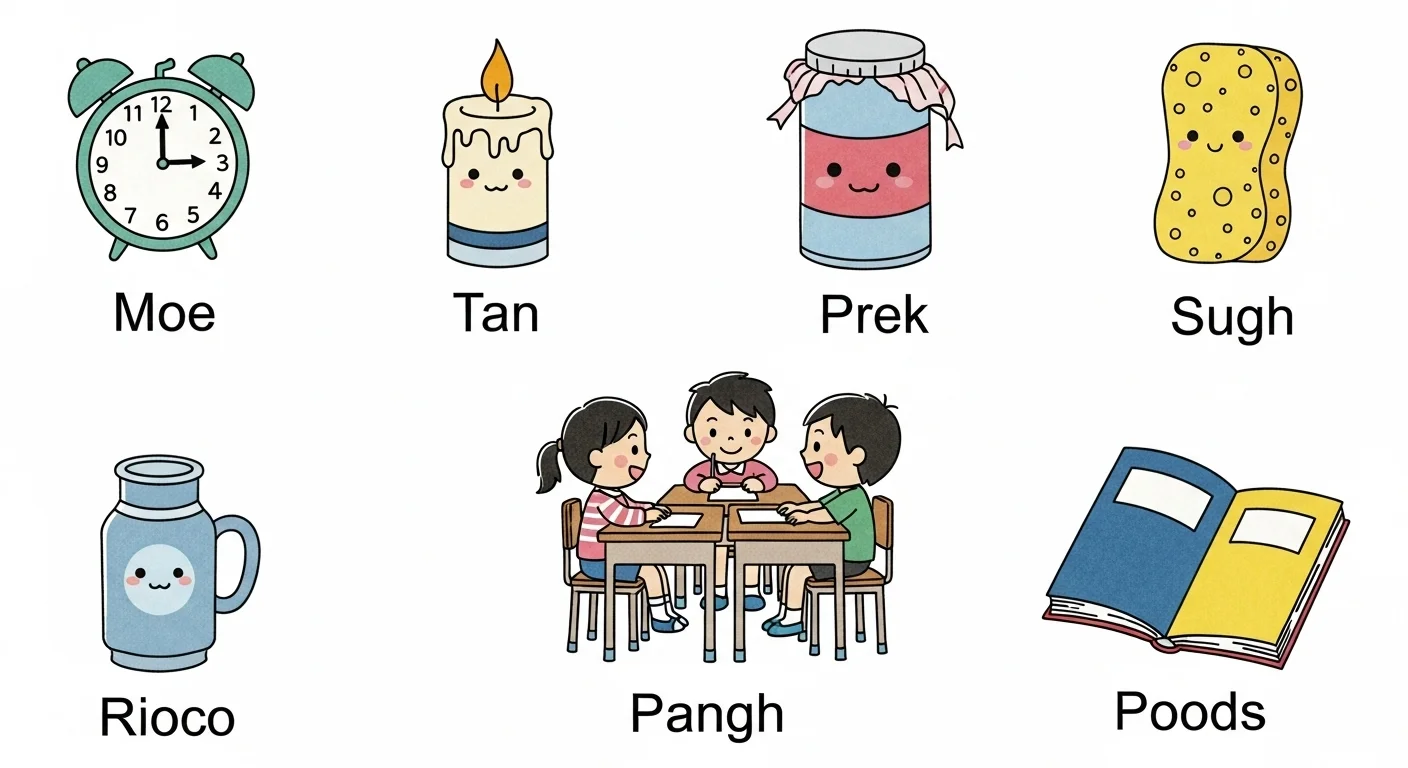
- Riddle: What is it that you can keep after giving it to someone?
Hint: Think about something intangible you can share without losing.
Answer: Your word
- Riddle: What has a neck but no head?
Hint: Consider everyday objects with a narrow part but no face.
Answer: A bottle
- Riddle: What comes once in a minute, twice in a moment, but never in a thousand years?
Hint: Focus on the letters in the words, not time itself.
Answer: The letter “m”
- Riddle: What has keys but can’t open locks?
Hint: Look for something with “keys” that serves a different purpose.
Answer: A piano
- Riddle: What has a face and two hands but no arms or legs?
Hint: Think of an object that measures time.
Answer: A clock
For more time-themed puzzles, explore clock riddles.
- Riddle: I’m tall when I’m young, and short when I’m old. What am I?
Hint: Consider something that shrinks with use over time.
Answer: A candle
- Riddle: What has a heart but no pulse?
Hint: Look for an object with a “heart” as its core.
Answer: An artichoke
- Riddle: I’m full of holes, yet I can hold water. What am I?
Hint: Think of a household item that absorbs liquid despite holes.
Answer: A sponge
- Riddle: What has wings but cannot fly?
Hint: Consider a building or structure with “wings” as a feature.
Answer: A house (referring to its roof “wings” in Japanese architecture)
- Riddle: I’m always running but never move. What am I?
Hint: Think of something associated with time that “runs.”
Answer: A clock
- Riddle: What has a mouth but doesn’t eat?
Hint: Look for something with an opening called a “mouth.”
Answer: A river
- Riddle: What gets wetter the more it dries?
Hint: Consider an object used to dry something else.
Answer: A towel
- Riddle: I have cities but no people. What am I?
Hint: Think of something that represents places without living beings.
Answer: A map
- Riddle: What has a tongue but cannot talk?
Hint: Look for an object with a part called a “tongue.”
Answer: A shoe
- Riddle: I’m light as a feather, but you can’t hold me for long. What am I?
Hint: Think of something you can feel but not grasp for long.
Answer: Breath
- Riddle: What has a shadow but no substance?
Hint: Consider something that follows you but isn’t physical.
Answer: A shadow
- Riddle: I’m taken from a mine and shut up in a wooden case. What am I?
Hint: Think of a material used in writing tools.
Answer: Pencil lead (graphite)
- Riddle: What has a ring but no finger?
Hint: Look for something that makes a sound or has a circular shape.
Answer: A bell
- Riddle: I’m always in front of you but cannot be seen. What am I?
Hint: Think of something abstract that’s always ahead.
Answer: The future
- Riddle: What has a spine but no bones?
Hint: Consider an object with a “spine” as a structural feature.
Answer: A book
Medium Japanese Riddles
These riddles step up the challenge, blending wordplay and logic to test your problem-solving skills while remaining approachable.
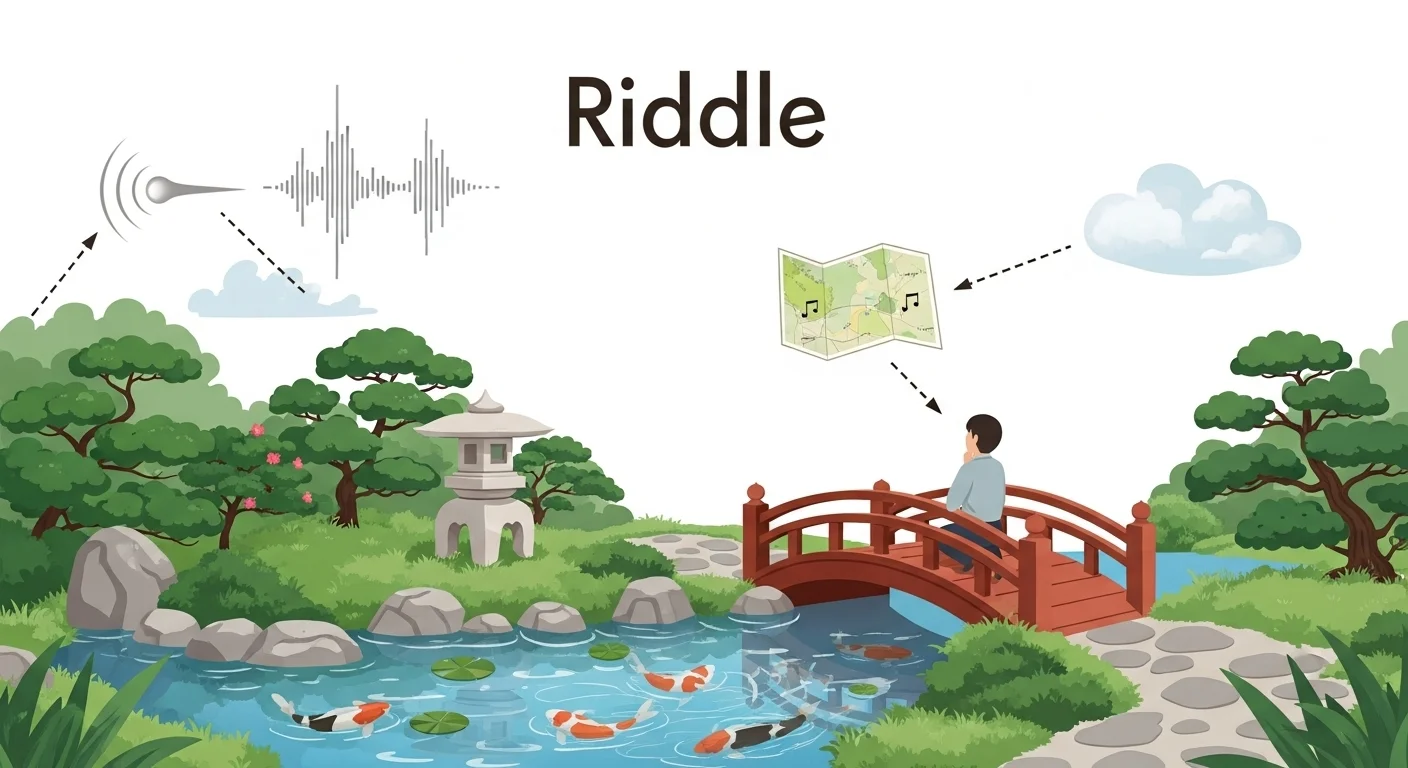
- Riddle: I speak without a mouth and hear without ears. I have no body, but I come alive with the wind. What am I?
Hint: Think of something that carries sound through the air.
Answer: An echo
Explore more sound-related puzzles with wind riddles.
- Riddle: The more you take, the more you leave behind. What am I?
Hint: Consider something that increases as you use it.
Answer: Footsteps
- Riddle: What has cities but no houses; forests but no trees; and rivers but no water?
Hint: Think of a visual representation of geography.
Answer: A map
- Riddle: What can travel around the world while staying in a corner?
Hint: Look for something small that moves globally via mail.
Answer: A stamp
- Riddle: What has one eye but can’t see?
Hint: Consider a tool with a single “eye” used for sewing.
Answer: A needle
- Riddle: I’m weightless, but you can see me. Put me in a bucket, and I’ll make it lighter. What am I?
Hint: Think of something that reduces weight when added.
Answer: A hole
- Riddle: What has hands but cannot clap?
Hint: Look for something with “hands” that measures time.
Answer: A clock
- Riddle: I’m always hungry and must be fed, but I never ask for bread. What am I?
Hint: Consider something that consumes fuel to keep going.
Answer: Fire
- Riddle: What has a bank but no money?
Hint: Think of a natural feature with a “bank.”
Answer: A river
- Riddle: I fly without wings, and I cry without eyes. What am I?
Hint: Look for something in the sky that brings tears.
Answer: A cloud
- Riddle: What has a neck but no head, a body but no legs, and arms but no hands?
Hint: Think of a wearable item with these parts.
Answer: A shirt
- Riddle: I’m tall when I’m born, but I get shorter as I grow. What am I?
Hint: Consider something that shrinks with use.
Answer: A pencil
- Riddle: What has a head but no face, and a body but no feet?
Hint: Look for a coin or currency with these features.
Answer: A penny
- Riddle: I’m broken when you speak. What am I?
Hint: Think of something disrupted by sound.
Answer: Silence
- Riddle: What has a roof but no walls?
Hint: Consider a natural or simple structure with a cover.
Answer: A mushroom
- Riddle: I’m full of keys but can’t open anything. What am I?
Hint: Think of an instrument with “keys” for music.
Answer: A typewriter
- Riddle: What runs all day but never gets tired?
Hint: Look for something that flows continuously.
Answer: A river
- Riddle: I have branches but no leaves. What am I?
Hint: Think of an organization with “branches.”
Answer: A bank
- Riddle: What can you break without touching it?
Hint: Consider something abstract that can be “broken.”
Answer: A promise
- Riddle: I’m seen in the day but not at night, yet I’m always there. What am I?
Hint: Think of something obscured by darkness but always present.
Answer: A star
Hard Japanese Riddles
Designed for seasoned solvers, these riddles demand lateral thinking and a keen eye for subtle clues, pushing your mind to its limits.

- Riddle: I am not alive, but I grow; I don’t have lungs, but I need air; I don’t have a mouth, but water kills me. What am I?
Hint: Think of something that thrives on air but is destroyed by water.
Answer: Fire
- Riddle: What is always coming but never arrives?
Hint: Consider something you expect daily but never truly “reaches” you.
Answer: Tomorrow
- Riddle: What has a bottom at the top?
Hint: Think of a body part where the “bottom” is positioned high.
Answer: Your legs
- Riddle: What can be broken but is never held?
Hint: Look for something abstract you can violate without touching.
Answer: A promise
- Riddle: What is so fragile that saying its name breaks it?
Hint: Think of something disrupted by any sound.
Answer: Silence
- Riddle: I’m in the sky but not a star, I move but don’t walk, and I bring shade. What am I?
Hint: Consider something floating above that casts shadows.
Answer: A cloud
- Riddle: I’m born in silence, die in noise, and am invisible to all. What am I?
Hint: Think of something that exists only in quiet.
Answer: Silence
- Riddle: I have a tail but no body, and I’m used to measure. What am I?
Hint: Look for a tool with a “tail” for measuring.
Answer: A tape measure
- Riddle: I’m always moving but never leave my place. What am I?
Hint: Think of something fixed that still “moves” in function.
Answer: A clock’s hands
- Riddle: I’m heavy when empty and light when full. What am I?
Hint: Consider something that gets lighter as it’s filled with holes.
Answer: A net
- Riddle: I’m heard in the mountains but not in the plains. What am I?
Hint: Think of a sound that bounces in specific environments.
Answer: An echo
- Riddle: I’m carried by the wind but have no weight. What am I?
Hint: Look for something intangible moved by air.
Answer: A scent
- Riddle: What has a heart that doesn’t beat and leaves that don’t fall?
Hint: Think of a plant with a “heart” and “leaves.”
Answer: A cabbage
- Riddle: I’m used to catch but never thrown. What am I?
Hint: Consider something you “catch” like an illness.
Answer: A cold
- Riddle: What grows bigger the more you take away from it?
Hint: Think of something that expands when material is removed.
Answer: A hole
- Riddle: I’m full of holes but can hold things tight. What am I?
Hint: Look for something porous yet secure.
Answer: A net
- Riddle: What has a voice but no mouth?
Hint: Think of something that produces sound without a mouth.
Answer: A bell
- Riddle: I’m always at the end of a rainbow but can’t be reached. What am I?
Hint: Consider the mythical treasure at a rainbow’s end.
Answer: A pot of gold
- Riddle: What has a face but no eyes, and hands but no fingers?
Hint: Think of something with a “face” and “hands” for time.
Answer: A clock
- Riddle: I’m alive without breath, as cold as death. What am I?
Hint: Look for a creature that thrives in water without breathing air.
Answer: A fish
Cultural Japanese Riddles
Rooted in Japan’s rich traditions, these riddles highlight iconic elements like food, clothing, and festivals, offering a cultural journey. For a deeper understanding of Japanese traditions, visit this cultural overview by the Japan Foundation.
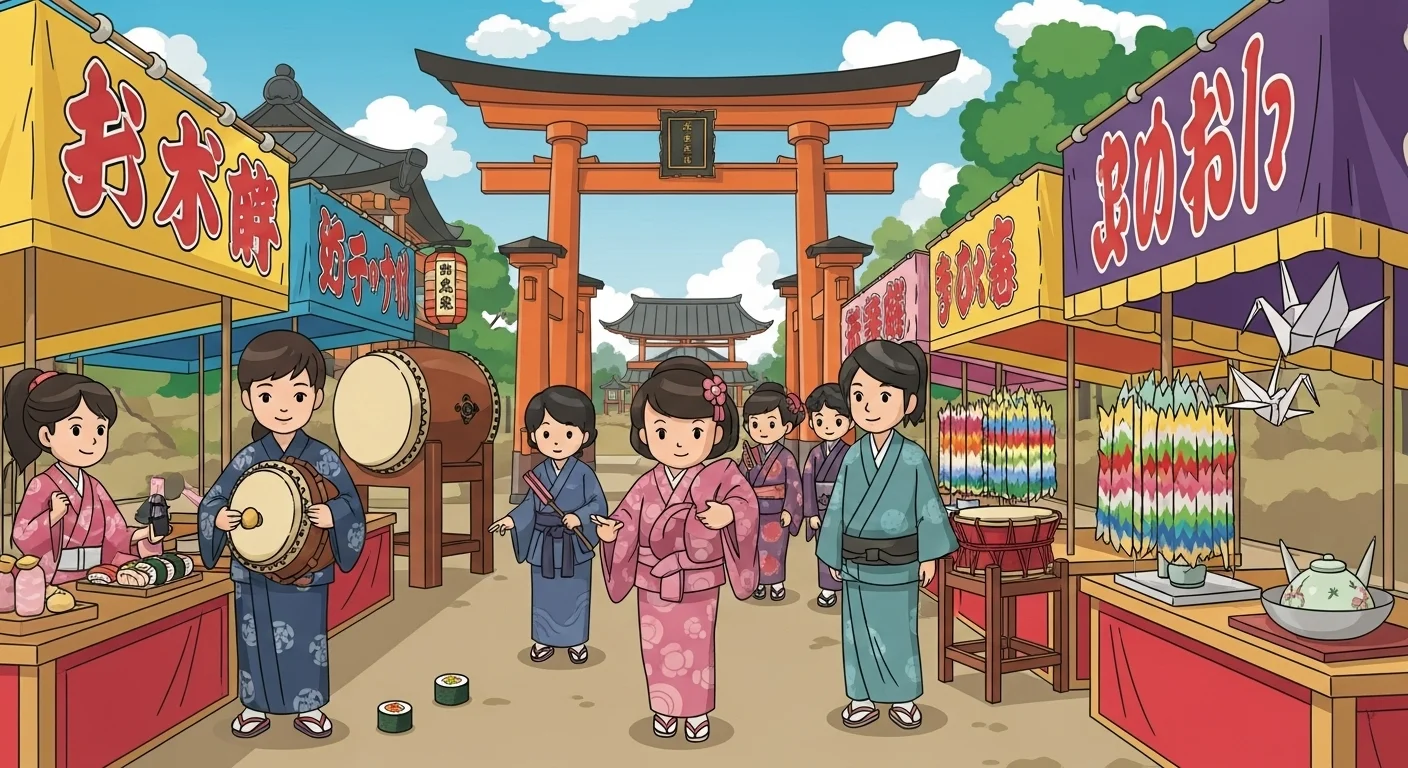
- Riddle: I am a traditional Japanese garment, often worn during special occasions. What am I?
Hint: Think of clothing worn at festivals or weddings.
Answer: Kimono
- Riddle: In Japan, I am a famous cherry tree, known for my pink flowers. What am I?
Hint: Consider Japan’s iconic springtime bloom.
Answer: Sakura (Cherry Blossom)
- Riddle: I am a type of wrestling where two men enter a ring, but one is often thrown out. What am I?
Hint: Think of a traditional Japanese sport with a circular arena.
Answer: Sumo
- Riddle: I am a famous temple in Kyoto, known for my gate with giant wooden sandals. What am I?
Hint: Look for a shrine with thousands of red torii gates.
Answer: Fushimi Inari Taisha
- Riddle: I am a dish made of raw fish, sometimes served with rice. What am I?
Hint: Think of a Japanese delicacy often found at sushi bars.
Answer: Sashimi or Sushi
- Riddle: I’m a Japanese tea ceremony bowl, crafted with care. What am I?
Hint: Consider a vessel used in a meditative ritual.
Answer: Chawan
- Riddle: I’m a Japanese fan, used in dance or to cool you down. What am I?
Hint: Think of a foldable item used in traditional performances.
Answer: Sensu (Folding Fan)
- Riddle: I’m a Japanese drum, loud at festivals. What am I?
Hint: Look for an instrument played during celebrations.
Answer: Taiko
- Riddle: I’m a Japanese gate that stands at a shrine’s entrance. What am I?
Hint: Think of a red structure marking sacred ground.
Answer: Torii
- Riddle: I’m a Japanese noodle, slurped in broth. What am I?
Hint: Consider a popular dish served hot or cold.
Answer: Ramen
- Riddle: I’m a Japanese paper art, folded into shapes. What am I?
Hint: Think of a craft creating cranes or flowers.
Answer: Origami
- Riddle: I’m a Japanese festival lantern, floating on water. What am I?
Hint: Look for something lit during Obon to honor ancestors.
Answer: Toro Nagashi
- Riddle: I’m a Japanese sword, carried by warriors. What am I?
Hint: Think of a weapon associated with samurai.
Answer: Katana
- Riddle: I’m a Japanese theater form with masked actors. What am I?
Hint: Consider a traditional performance with slow movements.
Answer: Noh
- Riddle: I’m a Japanese rice cake, eaten at New Year. What am I?
Hint: Look for a sticky treat symbolizing good luck.
Answer: Mochi
- Riddle: I’m a Japanese flower arrangement, balanced and serene. What am I?
Hint: Think of an art form emphasizing harmony.
Answer: Ikebana
- Riddle: I’m a Japanese footwear, worn with kimono. What am I?
Hint: Consider wooden sandals with a distinctive sound.
Answer: Geta
- Riddle: I’m a Japanese castle, white and majestic. What am I?
Hint: Think of a famous fortress in Himeji.
Answer: Himeji Castle
- Riddle: I’m a Japanese hot spring, relaxing and steamy. What am I?
Hint: Look for a place to soak in natural waters.
Answer: Onsen
- Riddle: I’m a Japanese poetry form with five-seven-five syllables. What am I?
Hint: Think of a short poem capturing nature’s beauty.
Answer: Haiku
Funny Japanese Riddles
With a playful twist, these riddles use humor and Japanese cultural references to bring smiles and laughter to solvers of all ages.
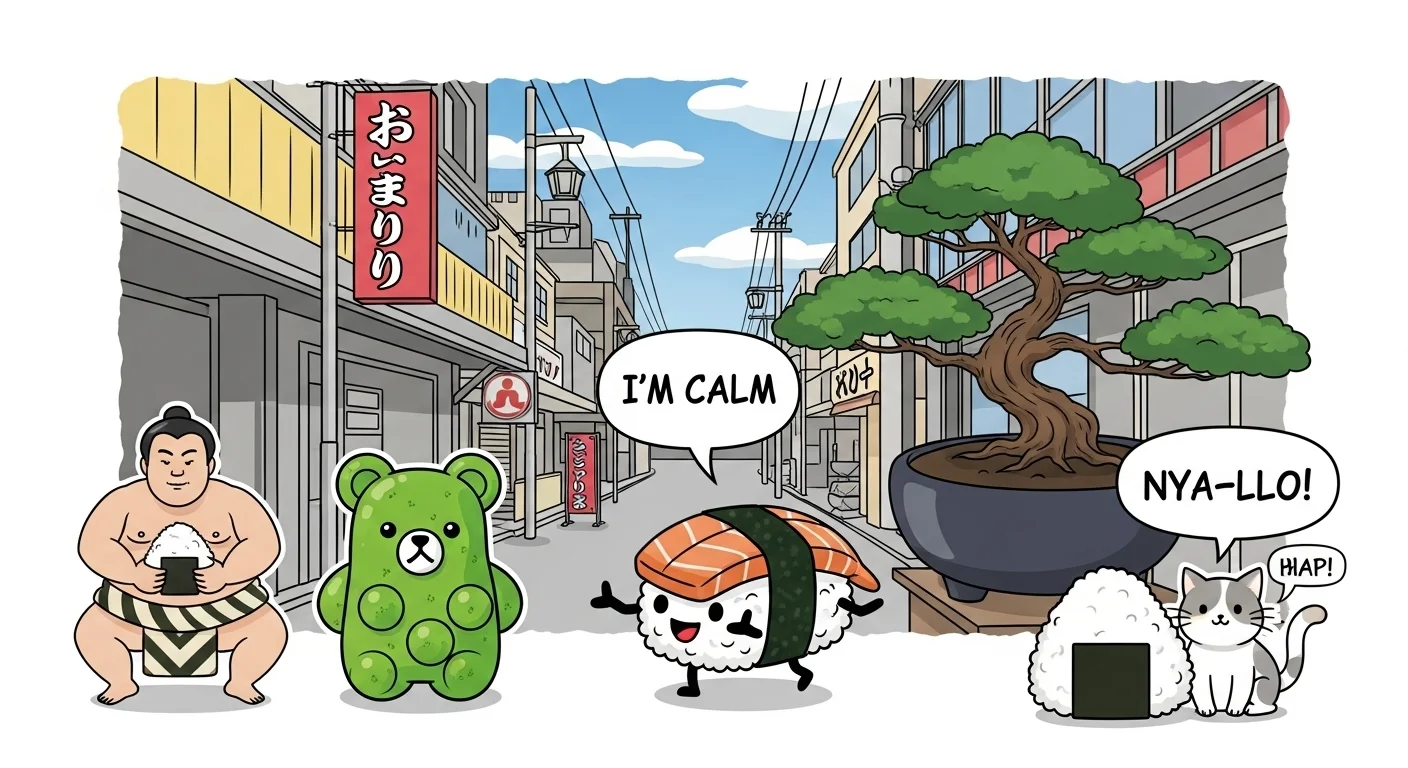
- Riddle: What do you call a bear with no teeth?
Hint: Think of a candy that sounds like a bear in Japanese.
Answer: A gummy bear (In Japanese, gummy sounds like gumi, meaning “bear”).
- Riddle: Why did the scarecrow win an award?
Hint: Consider a pun about standing out in a field.
Answer: Because he was outstanding in his field (Works in Japanese with hatake for field).
- Riddle: What do you get when you cross a snowman and a vampire?
Hint: Think of a chilly, biting result.
Answer: Frostbite (Adapted in Japanese as yuki otoko to kyuketsuki).
- Riddle: Why don’t Japanese ghosts haunt at noon?
Hint: Consider when ghosts are most active in folklore.
Answer: Because they prefer the night shift.
- Riddle: What’s a sushi’s favorite dance?
Hint: Think of a dance that sounds like a sushi ingredient.
Answer: The wasabi waltz.
- Riddle: Why did the mochi go to therapy?
Hint: Consider mochi’s sticky nature.
Answer: It had too many sticky relationships.
- Riddle: What’s a sumo wrestler’s favorite snack?
Hint: Think of something round like a sumo ring.
Answer: A rice ball (onigiri).
- Riddle: Why did the origami crane fail at comedy?
Hint: Consider origami’s rigid structure.
Answer: It kept folding under pressure.
- Riddle: What did the ramen say to the udon?
Hint: Think of a playful rivalry between noodles.
Answer: You’re too thick to compete!
- Riddle: Why was the bonsai tree so calm?
Hint: Consider the careful pruning of bonsai.
Answer: It was always trimmed for peace.
- Riddle: What’s a ninja’s favorite game?
Hint: Think of a game about hiding.
Answer: Hide-and-seek.
- Riddle: Why did the chopsticks break up?
Hint: Consider chopsticks as a pair.
Answer: They couldn’t stay together.
- Riddle: What’s a Japanese cat’s favorite greeting?
Hint: Think of a cat’s sound in Japanese culture.
Answer: Nya-llo!
- Riddle: Why did the sushi roll blush?
Hint: Consider a shy ingredient in sushi.
Answer: It was wrapped in seaweed love.
- Riddle: What’s a Japanese lantern’s worst fear?
Hint: Think of what extinguishes a lantern’s light.
Answer: A strong breeze.
- Riddle: Why did the tempura shrimp join a band?
Hint: Consider tempura’s crispy texture.
Answer: It loved to make a crunching beat.
- Riddle: What did the Japanese fan say to the heat?
Hint: Think of a fan’s cooling action.
Answer: I’ll blow you away!
- Riddle: Why was the koi fish bad at secrets?
Hint: Consider a fish’s environment.
Answer: It kept swimming in circles.
- Riddle: What’s a Japanese umbrella’s favorite weather?
Hint: Think of when an umbrella is most useful.
Answer: A rainy day.
- Riddle: Why did the rice ball go to school?
Hint: Consider onigiri’s shape and learning.
Answer: To become well-rounded.
Tricky Japanese Riddles
These riddles require a sharp mind and lateral thinking, often hiding clever twists inspired by Japanese culture.
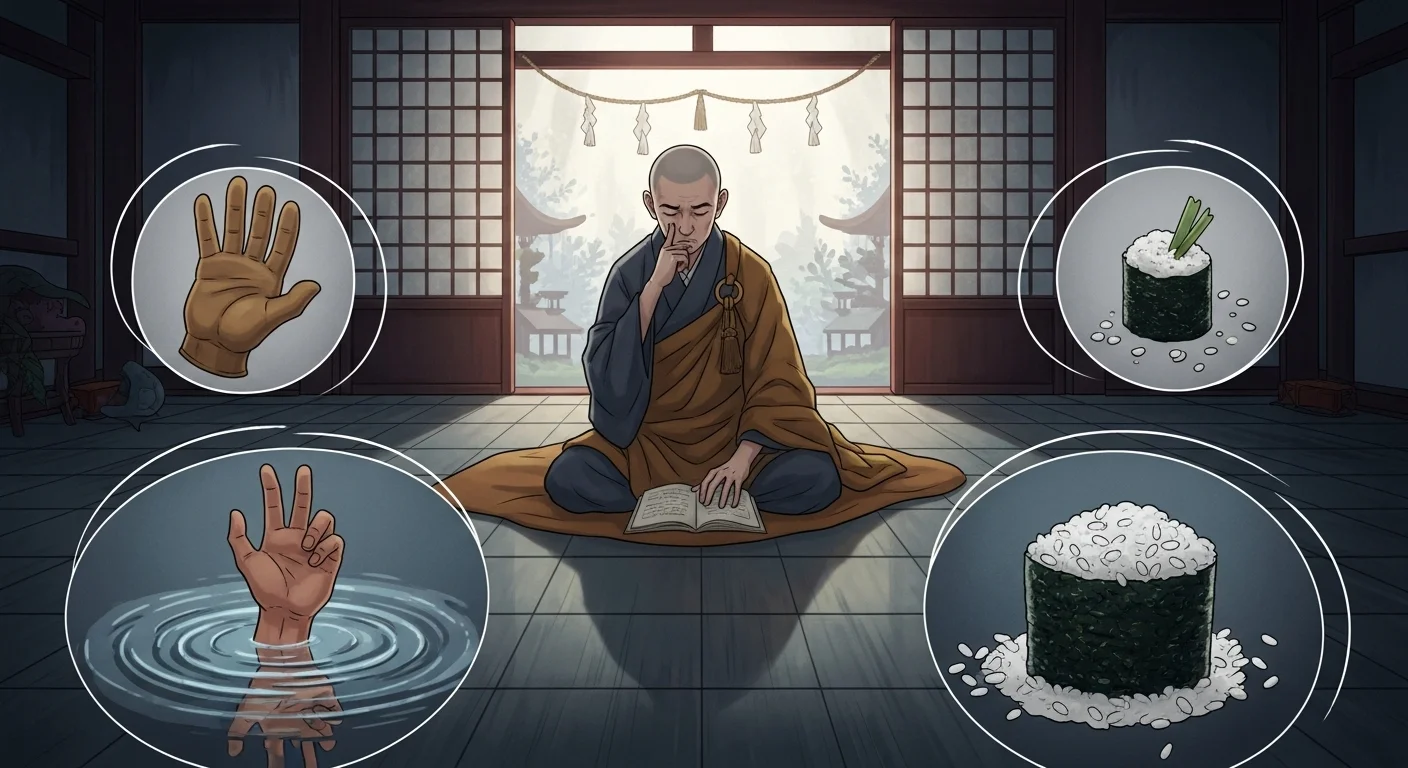
- Riddle: What has a thumb and four fingers but is not alive?
Hint: Think of something that covers your hand.
Answer: A glove
- Riddle: What has a bed but never sleeps, can run but never walks, and has a mouth but never talks?
Hint: Consider a natural feature with these parts.
Answer: A river
For more water-themed puzzles, try water riddles.
- Riddle: What can you catch but not throw?
Hint: Think of something you “catch” like a disease.
Answer: A cold
- Riddle: I’m present in every room but never take up space. What am I?
Hint: Think of something intangible in every room.
Answer: Air
- Riddle: I’m cut but never bleed, and I’m used to serve. What am I?
Hint: Consider a food item that’s sliced.
Answer: Sushi
- Riddle: I’m carried by all but owned by none. What am I?
Hint: Think of something everyone has but doesn’t possess.
Answer: A name
- Riddle: I’m seen in water but never wet. What am I?
Hint: Look for something that appears in water but stays dry.
Answer: A reflection
- Riddle: I’m spoken but never heard. What am I?
Hint: Consider something said silently.
Answer: A thought
- Riddle: I’m broken by walking but fixed by standing. What am I?
Hint: Think of something fragile underfoot.
Answer: Ice
- Riddle: I’m full of eyes but cannot see. What am I?
Hint: Look for something with “eyes” as a pattern.
Answer: A potato
- Riddle: I’m used to bind but have no strings. What am I?
Hint: Think of a Japanese technique for joining without ties.
Answer: Sushi rice (sticky rice binds ingredients).
- Riddle: I’m loud when still but silent when moving. What am I?
Hint: Consider a temple feature that sounds when stationary.
Answer: A bell
- Riddle: I’m born in the dark but die in the light. What am I?
Hint: Think of something that thrives in darkness.
Answer: A dream
- Riddle: I’m carried by the sea but never sink. What am I?
Hint: Look for something that floats effortlessly.
Answer: Seaweed
- Riddle: I’m counted but never touched. What am I?
Hint: Think of something abstract you tally.
Answer: Time
- Riddle: I’m shared by all but belong to none. What am I?
Hint: Consider a public resource in Japan.
Answer: A park
- Riddle: I’m seen in groups but never alone. What am I?
Hint: Think of a Japanese cultural symbol often in clusters.
Answer: A cherry blossom
- Riddle: I’m opened daily but never closed. What am I?
Hint: Look for something you “open” metaphorically.
Answer: Your eyes
- Riddle: I’m written but never read. What am I?
Hint: Think of something written for a specific purpose.
Answer: A gravestone
- Riddle: I’m lost in translation but found in understanding. What am I?
Hint: Consider something cultural that requires context.
Answer: A proverb
Historical Japanese Riddles
Travel back in time with these riddles, inspired by Japan’s feudal past, from samurai to ancient scrolls, offering a historical puzzle adventure.
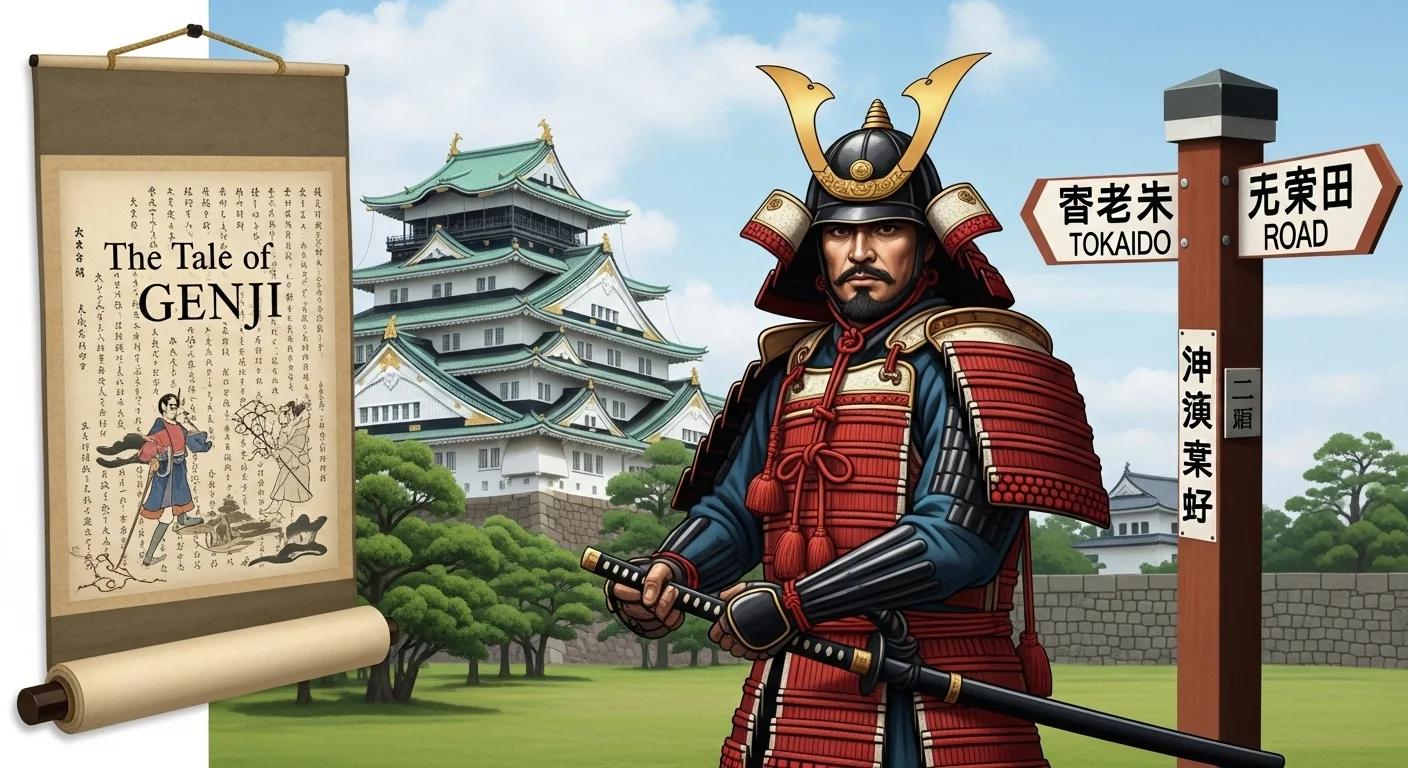
- Riddle: I’m a warrior’s code, guiding honor in battle. What am I?
Hint: Think of a samurai’s ethical principles.
Answer: Bushido
Learn more about historical puzzles with world history riddles.
- Riddle: I’m a Japanese castle, guarding the shogun’s power. What am I?
Hint: Consider a historic fortress in Tokyo.
Answer: Edo Castle
- Riddle: I’m a scroll of tales, written in ancient courts. What am I?
Hint: Think of a famous Heian-era literary work.
Answer: The Tale of Genji
- Riddle: I’m a warrior class, wielding swords in feudal Japan. What am I?
Hint: Look for a group known for loyalty and combat.
Answer: Samurai
- Riddle: I’m a Japanese era of peace, lasting over 250 years. What am I?
Hint: Think of a long period under Tokugawa rule.
Answer: Edo Period
- Riddle: I’m a Japanese poet, wandering with my brush. What am I?
Hint: Consider a famous haiku master.
Answer: Basho
- Riddle: I’m a trade route, connecting ancient Japan. What am I?
Hint: Look for a historic path from Kyoto to Edo.
Answer: Tokaido Road
- Riddle: I’m a Japanese emperor, once considered divine. What am I?
Hint: Think of Japan’s ancient ruler title.
Answer: Emperor (Tenno)
- Riddle: I’m a Japanese armor, worn by warriors in battle. What am I?
Hint: Consider protective gear for samurai.
Answer: Yoroi
- Riddle: I’m a Japanese battle, ending an era in 1600. What am I?
Hint: Think of a decisive conflict for shogunate power.
Answer: Battle of Sekigahara
- Riddle: I’m a Japanese writing system, born in the Heian court. What am I?
Hint: Look for a syllabic script used by women.
Answer: Hiragana
- Riddle: I’m a Japanese temple, home to a giant Buddha. What am I?
Hint: Think of a historic site in Nara.
Answer: Todai-ji
- Riddle: I’m a Japanese merchant, thriving in Osaka’s past. What am I?
Hint: Consider a wealthy class in Edo Japan.
Answer: Chonin
- Riddle: I’m a Japanese warlord, unifying the land. What am I?
Hint: Think of a figure who became shogun in 1603.
Answer: Tokugawa Ieyasu
- Riddle: I’m a Japanese art form, depicting floating worlds. What am I?
Hint: Look for woodblock prints of Edo life.
Answer: Ukiyo-e
- Riddle: I’m a Japanese port, opened to the West in 1853. What am I?
Hint: Think of a harbor visited by Commodore Perry.
Answer: Yokohama
Nature-Inspired Japanese Riddles
These riddles celebrate Japan’s stunning landscapes, from sacred mountains to serene rivers, connecting solvers with nature’s beauty.
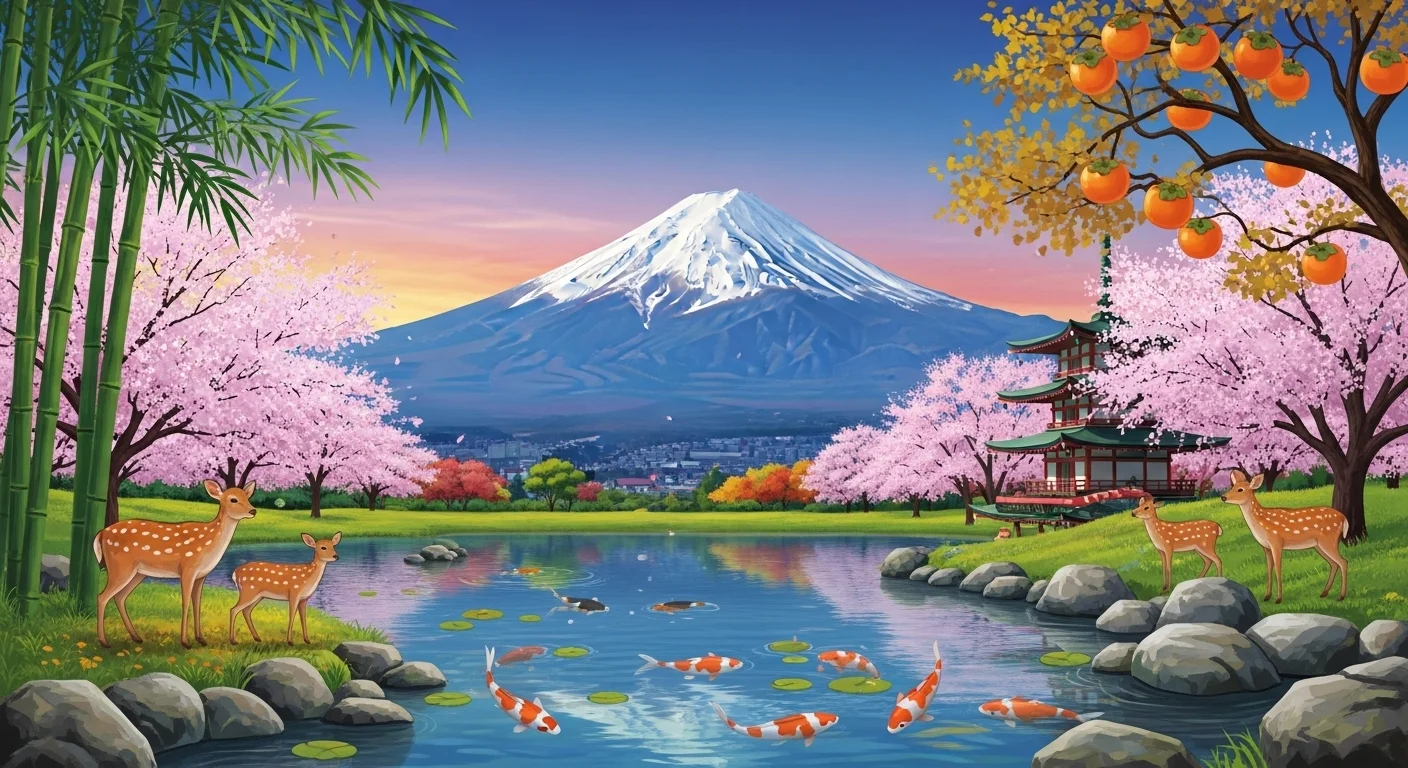
- Riddle: I’m a Japanese mountain, sacred and snow-capped. What am I?
Hint: Think of Japan’s tallest peak, a pilgrimage site.
Answer: Mount Fuji
- Riddle: I’m a Japanese tree, blooming in spring’s embrace. What am I?
Hint: Consider a tree celebrated during hanami.
Answer: Cherry Blossom (Sakura)
- Riddle: I’m a Japanese river, flowing through Kyoto’s heart. What am I?
Hint: Look for a river famous for its bridges.
Answer: Kamo River
- Riddle: I’m a Japanese fish, swimming in decorative ponds. What am I?
Hint: Think of a colorful fish symbolizing perseverance.
Answer: Koi
- Riddle: I’m a Japanese wind, howling in autumn. What am I?
Hint: Consider a seasonal breeze with a poetic name.
Answer: Typhoon
- Riddle: I’m a Japanese flower, blooming in summer’s heat. What am I?
Hint: Look for a flower linked to festivals.
Answer: Sunflower
- Riddle: I’m a Japanese island, born of volcanic fire. What am I?
Hint: Think of a southern island chain.
Answer: Okinawa
- Riddle: I’m a Japanese bird, singing at dawn. What am I?
Hint: Consider a bird known for its morning calls.
Answer: Nightingale (Uguisu)
- Riddle: I’m a Japanese forest, ancient and mossy. What am I?
Hint: Look for a UNESCO site in Yakushima.
Answer: Shiratani Unsuikyo
- Riddle: I’m a Japanese wave, crashing in art. What am I?
Hint: Think of a famous ukiyo-e print.
Answer: The Great Wave (Kanagawa)
- Riddle: I’m a Japanese fruit, sweet in autumn. What am I?
Hint: Consider a fruit celebrated in fall festivals.
Answer: Persimmon (Kaki)
- Riddle: I’m a Japanese bamboo, tall and swaying. What am I?
Hint: Look for a grove in Kyoto’s Arashiyama.
Answer: Bamboo Forest
- Riddle: I’m a Japanese lake, reflecting Mount Fuji. What am I?
Hint: Think of a scenic lake near Fuji.
Answer: Lake Kawaguchi
- Riddle: I’m a Japanese deer, wandering Nara’s parks. What am I?
Hint: Consider a sacred animal in a historic city.
Answer: Sika Deer
- Riddle: I’m a Japanese season, bringing red leaves. What am I?
Hint: Look for a time of colorful foliage.
Answer: Autumn
- Riddle: I’m a Japanese stone, guiding paths in gardens. What am I?
Hint: Think of a feature in Zen gardens.
Answer: Stepping Stone
Modern Japanese Riddles
Reflecting Japan’s vibrant present, these riddles draw from technology, pop culture, and urban life, blending tradition with modernity.
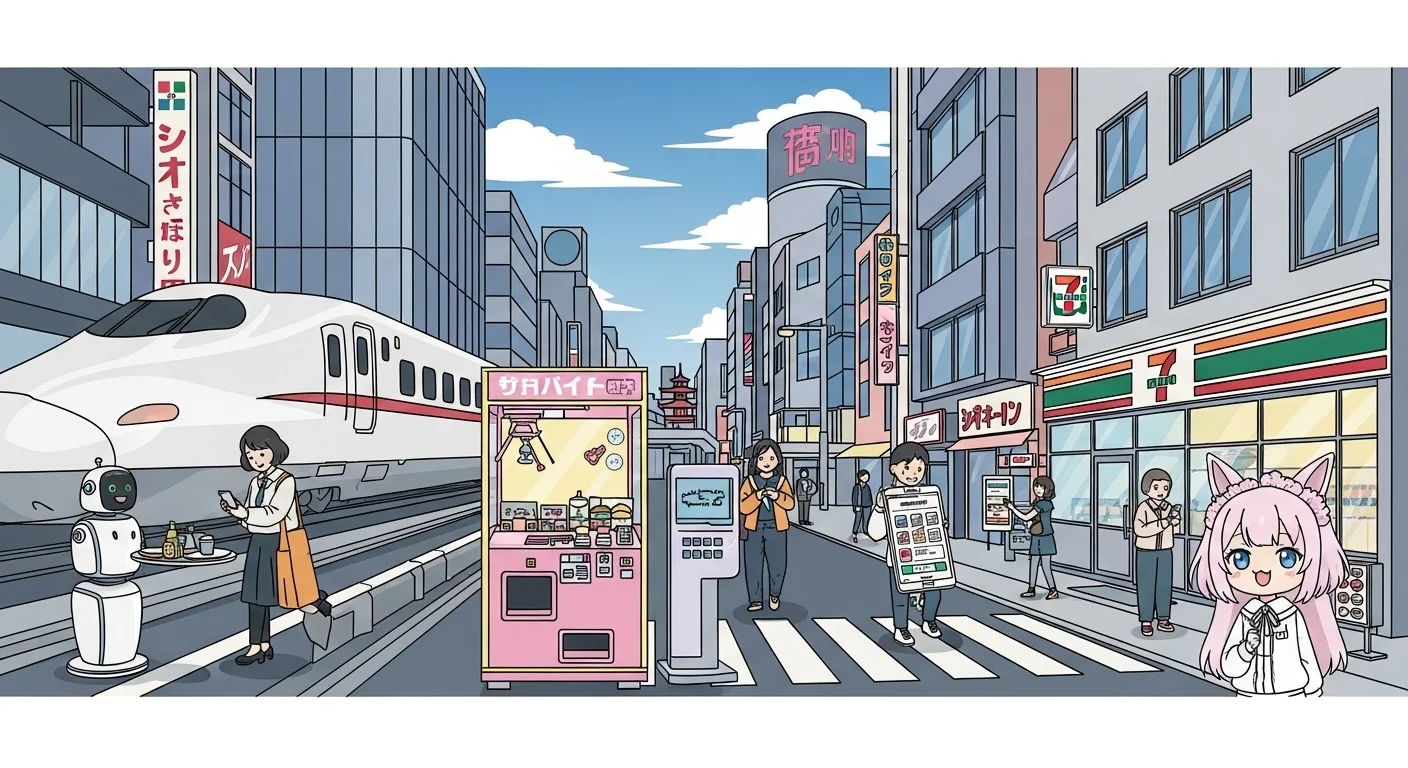
- Riddle: I’m a Japanese train, speeding past Fuji. What am I?
Hint: Think of a high-speed rail system.
Answer: Shinkansen (Bullet Train)
Discover more travel-themed puzzles with train riddles.
- Riddle: I’m a Japanese robot, serving in cafes. What am I?
Hint: Consider a modern service automaton.
Answer: Robot Waiter
- Riddle: I’m a Japanese phone app, guiding tourists. What am I?
Hint: Look for a translation tool used by travelers.
Answer: Google Translate
- Riddle: I’m a Japanese arcade game, clawing at prizes. What am I?
Hint: Think of a machine in game centers.
Answer: Claw Machine
- Riddle: I’m a Japanese cartoon, loved worldwide. What am I?
Hint: Consider Japan’s animated export.
Answer: Anime
- Riddle: I’m a Japanese vending machine, selling hot meals. What am I?
Hint: Look for a machine with diverse offerings.
Answer: Food Vending Machine
- Riddle: I’m a Japanese fashion, born in Harajuku. What am I?
Hint: Think of a colorful street style.
Answer: Harajuku Fashion
- Riddle: I’m a Japanese game console, played at home. What am I?
Hint: Consider a popular gaming device.
Answer: Nintendo Switch
- Riddle: I’m a Japanese convenience store, open 24/7. What am I?
Hint: Look for a ubiquitous shop chain.
Answer: 7-Eleven
- Riddle: I’m a Japanese music genre, sung by virtual stars. What am I?
Hint: Think of a digital idol phenomenon.
Answer: Vocaloid
- Riddle: I’m a Japanese app, connecting friends with stickers. What am I?
Hint: Consider a popular messaging platform.
Answer: LINE
- Riddle: I’m a Japanese capsule, offering tiny sleeps. What am I?
Hint: Look for a compact hotel option.
Answer: Capsule Hotel
- Riddle: I’m a Japanese tech giant, making cameras. What am I?
Hint: Think of a brand known for photography.
Answer: Canon
- Riddle: I’m a Japanese festival, lighting up summer nights. What am I?
Hint: Consider a modern fireworks display.
Answer: Sumida River Fireworks
- Riddle: I’m a Japanese drink, fizzy and marble-topped. What am I?
Hint: Look for a nostalgic soda with a unique cap.
Answer: Ramune
- Riddle: I’m a Japanese toy, spinning on your finger. What am I?
Hint: Think of a traditional spinning game.
Answer: Beyblade
How to Solve Japanese Riddles
At first, solving nazo nazo may seem extremely challenging but by training you will be able to learn patterns and methods of solving it. These are some basic guidelines to follow:
- Understand the Language: There are a lot of Japanese riddles based on wordplay and it can be good to know some of the basic words of Japanese. A lot of riddles are however translated or adapted by the non native speakers. Learn more about Japanese language nuances from Tofugu.
- Look for Cultural Clues: The references to Japanese tradition, festivals or everyday life can be made in the riddles. You can get an upper hand by familiarizing yourself with the Japanese culture. Explore Japanese culture insights from Japan National Tourism Organization for context.
- Think Creatively: Japanese riddles are frequently supposed to think outside the box. Do not be afraid of thinking out of box solutions.
- Practice Regularly: The more riddles you figure out, the more you will train yourself to identify common patterns and obscurities.
- Learn from Answers: Once you figure out a riddle (or when you can get no where, look at the answer to see how it works. This will assist you to solve any future puzzle.
For a structured approach to puzzle-solving, check out this SEO-optimized riddle-solving guide from Semrush.
Conclusion: The Timeless Charm of Japanese Riddles
Japanese riddles do not consist of simple puzzles, they are more about festivity of language, culture, and creativity. Your mind will also be challenged by playing nazo nazo and you will understand more about the rich traditions of Japan. These riddles, which are fun to solve, aid to study Japanese language, or exchange with friends and family members, are a tasty way of experiencing the Japanese spirit.
The reason as to why I would be smiling every time I encounter a new riddle is because I have spent more than five months living as a Japanese. They remind me about the beauty of simplicity, joy of discovery. Well, then, why not begin your own riddle adventure today? Take a pen, call your friends and turn on the fun! For insights on why puzzles benefit mental development, read about riddles for kids’ mental growth.
Frequently Asked Questions (FAQs)
How to solve the Japanese ship riddle?
The riddle of the Japanese ship can be understood to mean a standard logical puzzle in which you have to move objects (e.g. a wolf, a goat and cabbage) across a river and you cannot break rules. The way to overcome it is to organize your trips, so that incompatible things are never left by themselves.
As, example, remove the goat away, then come back to the wolf, and bring the goat again, to leave off leaving the goat with the cabbage. You should train with similar logic games in order to acquire the strategy. Practice with similar logic puzzles from Brainzilla.
What is the kanji for riddle?
In Japanese, the kanji of riddle is 謎 (nazo). It is a puzzle or a riddle and it is a commonly applied term in nazo nazo (riddles).
What is the riddle all around the world?
This probably is a riddle involving something universal such as the sun: I appear in the East, set in the West and am visible everywhere on earth. Who am I?” The solution is the sun because it can be seen everywhere on earth and it follows a certain pattern.
Who has holes but holds water riddles?
The solution is sponge. A porous structure of a sponge has holes and yet it holds water. The riddle is an all-time favorite among the Japanese and the western world due to its witty straightforwardness.
Who is the most foreign riddle?
This riddle is not used as much but may suggest there could be a play regarding differences in culture. One response might be a tourist since he/she represents foreignness through his or her travelling to other lands that have not been conquered. In Japanese setting, it may suggest gaijin (foreigner), but in a funny manner.
What is a haiku riddle?
The haiku riddle is a kind of puzzle which manifests itself in the form of a classical Japanese haiku (5-7-5 syllables) and has a witty answer. E.g. Five syllables sing, / Seven, plus five, once more, / What am I? It is an answer written in haiku.
